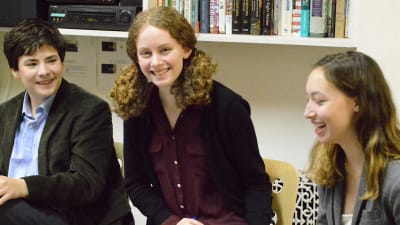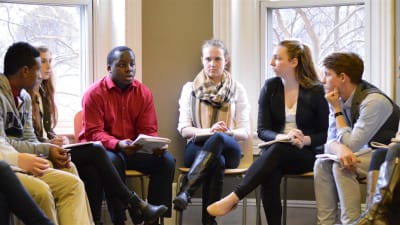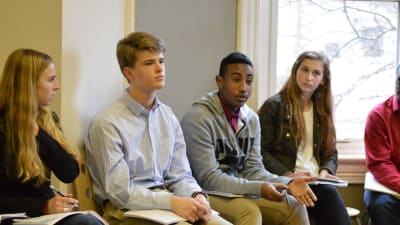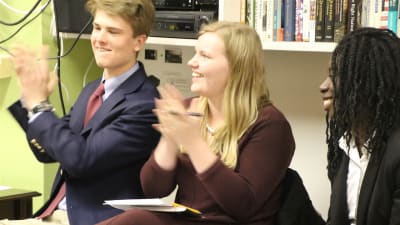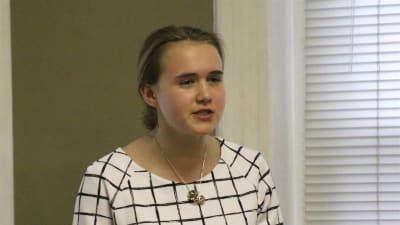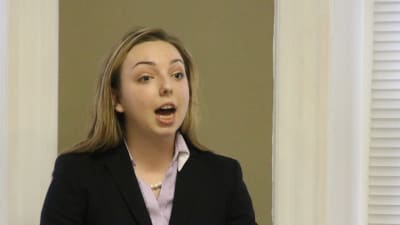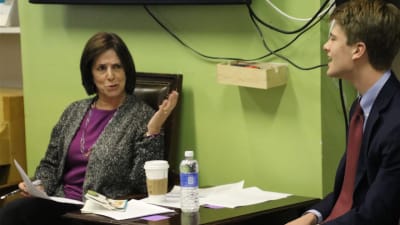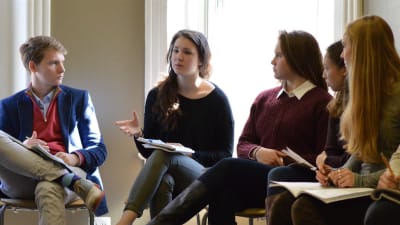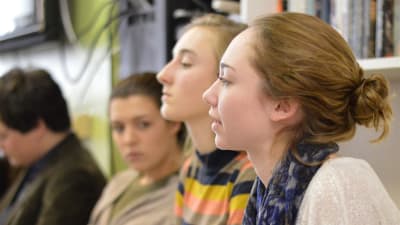Spring 2016 takes on the Supreme Court; gets Master Classes from White House speechwriter and Constitutional expert
The most effective educators help students wrestle with classic questions and current challenges. And they design learning activities, built around those questions and challenges, that allow students to build lifelong leadership skills. The past two weeks at SEGL help exemplify our commitment to these goals.
Each week included a signature part of the SEGL experience: the “Master Class.” Several times a semester, students present and defend a “deliverable” in front of a distinguished guest expert. The deliverable might be a policy memo, an ethical argument, or–as was the case these past two weeks–a Constitutional argument and a three-minute speech.
Justice Antonin Scalia’s sudden death last month caused an unprecedented political uproar in the middle of the 2016 Presidential campaign. The opportunity to nominate a new Supreme Court Justice has the potential to reshape our national landscape fundamentally, and all sides are hunkering down for the battle ahead.
In our first Supreme Court case study, we focused on the Constitution itself and one of the thorniest issues in recent decades: “affirmative action.” In December, the Court re-heard Fisher v. University of Texas, which concerns an affirmative action admissions policy at the University of Texas at Austin, and will now (barring an unexpected political compromise) decide the case with one fewer justice (actually only seven because Justice Elena Kagan has recused herself).
After a lecture introducing students to the Supreme Court, Constitutional law, and the 14th Amendment’s Equal Protection Clause, the students received their assignment: on Friday, in teams, they would act as law clerks advising a Supreme Court Justice on the Fisher case. The Justice would be played by a leading Constitutional scholar who once clerked for a real Supreme Court Justice (more on that below).
They then met with two experts on the subject from radically different perspectives. The first was longtime SEGL favorite Clark Neily, a noted attorney at the Institute for Justice, a libertarian public interest law firm. Neily is most famous for representing the plaintiffs in DC v. Heller, the landmark 2008 case that established an individual’s Second Amendment right to bear arms. In addition to his remarks about affirmative action, Neily spoke about the Heller case and others he is involved in, as well as libertarian philosophy.
The second was Dr. Alvin Thornton, Senior Academic Advisor to the President (and former chair of the Political Science Department) at Howard University. Thornton, a candidate for Congress in Maryland’s 4th District, spoke thoughtfully about his support for affirmative action.
To end our first Supreme Court case study, we traveled to Georgetown Law Center to meet with our “Justice”: Professor Michael Seidman, a leading and frequently-published Constitutional law expert who once clerked for Thurgood Marshall. Professor Seidman played the role of a Justice with collegial energy and faux orneriness: he pulled no punches as, group by group, the students presented their opinions. At every opportunity, Seidman interrupted with penetrating and dissenting questions that kept the students on their toes. (Seidman, a widely-known academic, holds that controversial view that the Constitution should be abolished.)
The session helped students hone their ability to think and speak on their feet, to question the premises of an adversary, and to collaborate as a team under pressure. More important, Seidman’s questions helped the students learn a new way of thinking: to approach Constitutional issues from a legal framework, not a political or emotional one. (“It’s not my job as a judge to decide what I think is best,” he says. “It is my job to interpret what the Constitution says.”) It is here that the students may have learned the most.
The following week, we continued our study of the Supreme Court controversy with longtime White House and State Department speechwriter Lissa Muscatine. Muscatine was Hillary Clinton’s top speechwriter for nearly twenty years, and also wrote speeches for President Bill Clinton. Our 2013 Golden Mug Award winner, she is skilled at preparing our students to write compelling speeches. And she critiques those speeches with a sensitive incisiveness that leaves students impressed and ready to revise.
Muscatine made two visits to SEGL last week. On Monday morning, she joined us for a 90-minute opening session, in which she told several speechwriting war stories (What was it like to author Hillary Clinton’s now-legendary 1995 “Women’s Rights are Human Rights” speech in Beijing? What was it like to write Clinton’s 2008 Democratic National Convention speech?), gave a list of speechwriting “do’s and don’t’s” (DO know your audience; DON’T use adjectives and adverbs!), and answered student questions about her career, about the Clintons, and about speechwriting.
Muscatine also crafted a challenging (hypothetical) case study (click on the link to see it!) involving a nomination to the Court. To complete the assignment, the students broke into groups of four to write six different speeches.
After a few days of debate and collaboration over speech drafts, each team presented its finished product to Muscatine on Friday afternoon. One by one, six students presented speeches, which were then shown on the flat-screen television that sits behind our speaker chairs. Muscatine engaged the entire room in a back-and-forth discussion after each speech, picking highlights and opportunities for revision each time. The students will take this feedback to revise their work one more time.
Muscatine stayed after for 45 minutes to answer individual questions and offer encouragement: the post-speaker gaggle is always a special opportunity at SEGL for more personal follow-up questions. (For independent bookstore fans: Muscatine–now retired from speechwriting–owns DC’s premier independent bookstore, Politics and Prose. Before her Master Class, she donated ten new books to SEGL’s library.)
Last week we also met with Dr. Renee Harrison, a professor of religious history at Howard and 11-year veteran of the Los Angeles police force. (She also served as Executive Director of a community-based theatre company in L.A.) We scheduled Dr. Harrison to supplement student discussion about criminal justice reform after the student-led visit to the Politics and Prose panel on race early in the semester. In addition to her thoughts on criminal justice and the “black lives matter” movement, Harrison was the first SEGL guest speaker in the history of the school to decline our speaker’s chair in favor of the wood IKEA seats our students use.
One more highlight: last week our U.S. History class held a mock Election of 1912, complete with fiery campaign speeches and clever posters all around the school. The debate over the future of our country that year echoes all the way to 2016, and amidst the fun the students were able to make several poignant connections. (You will have to ask the students which candidate won!)






